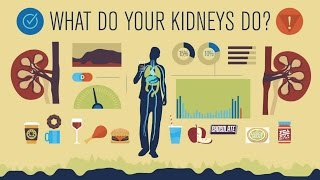(单词翻译:单击)
It's a hot day, and you've just downed several glasses of water, one after the other.
在炎热的一天,你喝下了好几杯的水,一杯接着一杯。
Behind the sudden urge that follows are two bean-shaped organs that work as fine-tuned internal sensors.
很快你感受到一股欲望(上厕所),这突然的欲望背后是两个豆子形状的器官,它们是保持体内和谐的传感器。
They balance the amount of fluid in your body, detect waste in your blood,
它们除了平衡身体里的水量,也能感测血液中的废物,
and know when to release the vitamins, minerals, and hormones you need to stay alive.
还能知道何时该释放出能让你维系生命的维他命、矿物质和荷尔蒙。
Say hello to your kidneys.
向你的肾脏打个招呼吧!
The main role of these organs is to dispose of waste products and to turn them into urine.
肾脏的主要功能就是清除废物,并且把废物转换成尿液。
The body's eight liters of blood pass through the kidneys between 20 and 25 times each day,
身体里八公升的血液,每天通过肾脏约20-25次,
meaning that, together, these organs filter about 180 liters every 24 hours.
也就是说,这对器官在24小时内总共过滤了180公升的血。
The ingredients in your blood are constantly changing as you ingest food and drink,
血液中的成分随着吸收食物和饮料,不断地变化其中的成分,
which explains why the kidneys need to be on permanent duty.
这也解释了为什么肾脏必须无时无刻的运作。
Blood enters each kidney through arteries that branch and branch,
血液透过分支的动脉来进入肾脏,
until they form tiny vessels that entwine with special internal modules, called nephrons.
动脉分支形成很细小的血管,缠绕一个很特别的内部单元,这个结构叫做肾元。
In each kidney, 1 million of these nephrons form a powerful array of filters and sensors that carefully sift through the blood.
在每个肾脏中,一百万个肾元形成有力的传感器和过滤器部队,它们小心翼翼地筛检血液。
This is where we see just how refined and accurate this internal sensing system is.
我们可以由此看出这内部感应系统是多么的优良和精确。
To filter the blood, each nephron uses two powerful pieces of equipment:
为了过滤血液,每个肾元有两个有强而有力的结构:
a blob-like structure called a glomerulus, and a long, stringy, straw-like tubule.
其中一个像水滴的叫做肾小球,另一个长形像绳子一样的叫做肾小管。
The glomerulus works like a sieve, allowing only certain ingredients, such as vitamins and minerals, to pass into the tubule.
肾小球就像筛子,只容许少数特定成分通过并进入肾小管,例如维他命和矿物质。

Then, this vessel's job is to detect whether any of those ingredients are needed in the body.
接着,肾小管的工作就是要感测这些成分中有哪些是身体所需要的。
If so, they're reabsorbed in amounts that the body needs, so they can circulate in the blood again.
若需要,它们会依需求量被再吸收,所以它们能够再回到血液中循环。
But the blood doesn't only carry useful ingredients. It contains waste products, too.
但是血液不仅仅携带有用的成分。它也含有废物。
And the nephrons have to figure out what to do with them.
肾小元必须要厘清该如何处理它们。
The tubules sense compounds the body doesn't need, like urea, left over from the breakdown of proteins,
肾小管会感应出体内不需要的成分,像是尿素、蛋白质分解后的残留物等等,
and redirects them as urine out of the kidneys and through two long sewers called ureters.
并且经过称为输尿管的两条长形通道,把这些废物改作尿液排出肾脏。
The tubes empty their contents into the bladder to be discharged, ridding your body of that waste once and for all.
输尿管把废物移到膀胱,等待被排出体外,一劳永逸的把废物全部排出。
There's water in that urine, too.
在尿液中也有水。
If the kidney detects too much of it in your blood,
如果肾脏感测到你的血液当中有太多水分,
for instance, when you've chugged several glasses at once, it sends the extra liquid to the bladder to be removed.
举例来说,如果你一口气灌下好几杯的水,肾脏会将多余的水分送到膀胱等待排出。
On the other hand, low water levels in the blood prompt the kidney to release some back into the blood stream,
另一方面来说,血液中的水分如果太少,会刺激肾脏释放回一些水分到血液中,
meaning that less water makes it into the urine.
意味着尿液中的水分也会比较少。
This is why urine appears yellower when you're less hydrated.
这也是为什么尿液在人体较缺水时会呈现较黄的颜色。
By controlling water, your kidneys stabilize the body's fluid levels.
肾脏控制水分来稳定体内的液体含量。
But this fine balancing act isn't the kidney's only skill.
不过,这个完美的平衡并不是肾脏唯一能做的。
These organs have the power to activate vitamin D to secrete a hormone called renin that raises blood pressure,
肾脏还拥有活化维他命D的功能,还能够分泌一种叫做肾素的荷尔蒙,它能够提高血压,
and another hormone called erythropoietin, which increases red blood cell production.
还能分泌另一种叫做红血球生成素的荷尔蒙,用来增加红血球产量。
Without the kidneys, our bodily fluids would spiral out of control.
没有肾脏,我们体内的液体会失去控制。
Every time we ate, our blood would receive another load of unsifted ingredients.
每次吃东西,我们的血液都会接受到一批未筛检的成分。
Soon, the buildup of waste would overload our systems and we'd expire.
很快的,堆积的废物增加了器官系统的负担,导致我们死亡。
So each kidney not only keeps things running smoothly. It also keeps us alive.
所以肾脏不仅仅让体内运转顺畅,它还维系了我们的生命。
Lucky then that we have two of these magical beans.
拥有两个如此神奇的豆子,我们真是幸运!


